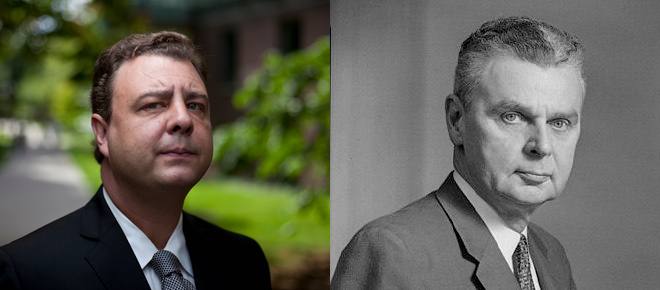Diefenbaker, Jr.?
A man claiming to be the Chief’s son will get access to the former PM’s DNA after all
Share

A Toronto man who believes he is John Diefenbaker’s biological son will get a chance to prove his lineage after all.
The Diefenbaker Canada Centre in Saskatoon, Sask., agreed today to grant access to personal artifacts in its collection to help George Dryden obtain a DNA sample and determine whether the late prime minister is his father.
“As previously indicated, we have sympathy for Mr. Dryden’s situation and are willing to help where possible,” wrote Michael Atkinson, the director of the centre, in a letter to Dryden’s lawyer Stephen Edell, and obtained by Macleans.ca.
“Specifically, we will make available to your client artifacts for inspection and DNA testing under the conditions that are outlined below.”
The centre had initially rebuffed the 42-year-old’s request for access, citing doubts that it had anything that would yield sufficient samples for testing.
“There were hair brushes, clothes brushes, bedding, blankets and things like that, all of which we inspected,” Atkinson told Postmedia News two weeks ago.
“Not only is there negligible DNA material, but more important … we could not ensure that anything we found actually did belong to Mr. Diefenbaker.”
The news delighted Dryden, who has been trying to prove his parentage as a part of a lawsuit filed last December against his non-biological father, Gordon Dryden, and other members of his family. (Dryden established last month through DNA testing that Gordon is, in fact, not his biological father.)
“I’ve gone from great disappointment two weeks ago to great relief,” he said in an interview. “It’s a real burden lifted from my shoulders. Diefenbaker is the only lead, and the best lead, that I have as to who my father is. With luck this will confirm that or prove it wrong. Hopefully we’ll know pretty shortly.”
Dryden has suspected the man known as “the Chief” was his father since last year, when family members on his mother’s side told him his mother, Mary Lou, had been friends with Diefenbaker in the late 1960s, and that family members had long supposed George was the former PM’s child.
Before marrying Gordon, Dryden’s mother had been active in the Progressive Conservative Party, and had been seen at public functions at Diefenbaker’s side.
As a result, Dryden spent the past few months contacting members of the extended Diefenbaker family in hopes of getting a DNA sample—only to be refused.
He was further frustrated by the Diefenbaker Centre’s initial position, given that modern DNA testing requires only a miniscule piece of skin or hair follicle. As for concerns the artifacts might not have belonged to the late PM: in the event of a match, the only way Diefenbaker could not be related would be if another member of Dryden’s immediate family used the brush, clothing or blankets from which the sample was obtained.
In explaining the change of heart, Atkinson said media reports had unfairly cast the museum as “refusing” Dryden’s request. “We will be following up with those [journalists] to clarify the centre’s position on the matter,” Atkinson wrote in his letter.
In his lawsuit, George Dryden alleges that Gordon mistreated him and connived to cut him out of inheritance money because he knew George was not his biological child.
The situation was made worse, the suit says, because Gordon was a prominent Liberal who served as treasurer of the federal party in the 1970s, while Diefenbaker was a Progressive Conservative.
The allegations have not been proven in court, and Gordon Dryden, now in his mid-80s, did not return calls placed to his home Thursday evening. If Dryden is proven to be Diefenbaker’s son, he would be the only known offspring of Canada’s 13th prime minister.
Twice a widower, Diefenbaker had no children with wives Edna (1929-51) and Olive (1953-76). He died in 1979.